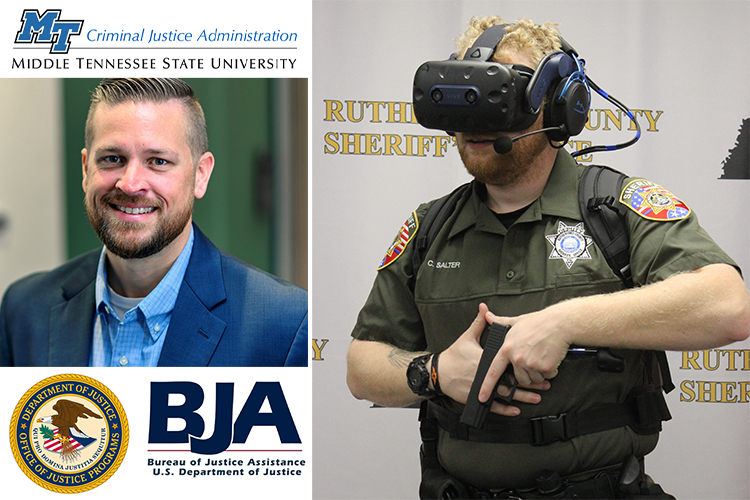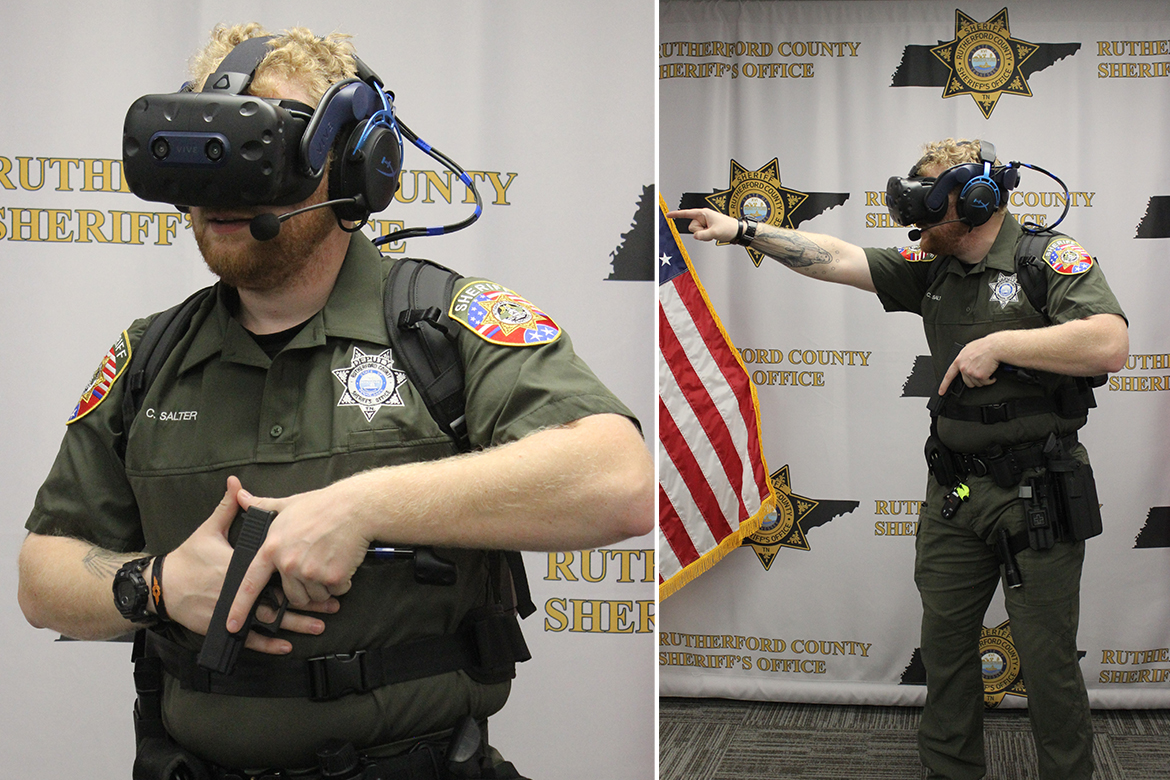Newswise — A Middle Tennessee State University Criminal Justice Administration professor is banking on virtual reality being an operative training tool for police officers and he plans to study the results.
Former police officer-turned-professor Ben Stickle co-authored a Bureau of Justice Assistance grant for the Rutherford County Sheriff’s Office, “Virtual Reality De-escalation Evidence-based Training Program,” that garnered $685,730 to be used over a three-year period. MTSU will receive $315,445 in partnership with the project for research.
Rutherford County is one of eight recipients of the highly competitive grant.
Stickle and Rutherford County Sheriff’s Lt. Michael Rodgers will monitor the virtual reality training to determine if it is equally effective as traditional personal training in de-escalation and crisis intervention.
“The goal of de-escalation is to calm the situation down so we don’t have to resort to use of force,” Stickle said. “It’s really a challenge to calm that person down to work through situations.”
The project will utilize Apex Officer, the top virtual reality training simulator built by police officers for police officers through the use of VR headsets.
Rodgers said other types of virtual reality training have pre-scripted scenarios while the virtual reality training system allows the trainer to script localized scenarios.
“A few of the unique aspects of this proposal are the individualized development of VR situations like schools, mental health crises, drug overdoses and rural settings, which will require data collection and stakeholder focus groups,” Stickle explained.
Community residents and mental health professionals can help adapt the scenarios for better training.
“We work with mental health providers and those with mental health issues to get feedback and create realistic, community-based scenarios that we then put into this virtual reality machine,” Stickle said.
The training is flexible and can be taken to other first-responder agencies and community events, Rodgers said.
“Through the use of the Apex Officer system and with collaboration from the community, the Sheriff’s Office hopes to provide more effective resolution for people in crisis through giving our deputies more exposure and tools such as de-escalation,” Rodgers said.
The grant was awarded in October 2023 and the planning phase began in January this year. Officers will meet with the community and begin developing scenarios based on their input.
Once scenarios are constructed, training will take place over the three-year period of the grant. Officers put on virtual reality goggles and then go through the scenarios.
“We will have a sheriff’s deputy, Sgt. Jason Brown, who is in control of the scenarios. After we’ve trained deputies in de-escalation skills, we get to practice using those skills virtually,” Stickle said.
Up to four deputies can participate at one time. “That way they experience working as a team,” Stickle said.
The deputy in charge of running the scenario will be able to change the response in real time.
“If deputies are doing well using appropriate verbal commands, the trainer can control the virtual person to follow the commands and abide,” Stickle said.
Deputies can also be placed in different locales with the Apex Officer simulator.
“Without going anywhere, you can train in a jail setting, a school or on a rural road,” Stickle said. “All these settings are important and we’re able to put this training into practice.”
Stickle said the virtual reality training also gives officers an awareness of different issues so they can understand how to respond.
“The virtual reality goggles allow officers to be immersed in the physical environment and engage with the community in a safe way and try different things to see how they work and learn from that,” Stickle said. “Ultimately we don’t want to use deadly force. We want to provide help to these people in crisis that doesn’t involve the criminal justice system.”
Once training starts, Stickle will begin collecting data and research angles through pre- and post-testing.
Additionally, Stickle proposed a randomized control trial by training only a portion of the deputies and monitoring outcomes.
While the grant is funding training for Rutherford County deputies, Stickle said he will help RCSO write best-practice guides that could possibly be shared and utilized with other agencies.
“In short, this research is complex and likely to lead to additional funding opportunities and significant scholarly attention,” Rodgers said.
MEDIA CONTACT
Register for reporter access to contact detailsArticle Multimedia

Credit:
Caption:

Credit:
Caption: Dr. Ben Stickle

Credit:
Caption: Deputy Christian Salter of the Rutherford County Sheriff’s Office demonstrates the use of Apex Officer, the top virtual reality training simulator built by police officers for law enforcement agencies. The virtual training will be studied by Middle Tennessee State University Criminal Justice Administration professor Ben Stickle as part of a Bureau of Justice Assistance grant he co-authored for the Rutherford County Sheriff’s Office that garnered $685,730 to be used over a three-year period. MTSU will receive $315,445 in partnership with the project for research.

Credit:
Caption:

Credit:
Caption:
RELATED EXPERTS
Ben Stickle
Professor of Criminal Justice Administration
Middle Tennessee State University
